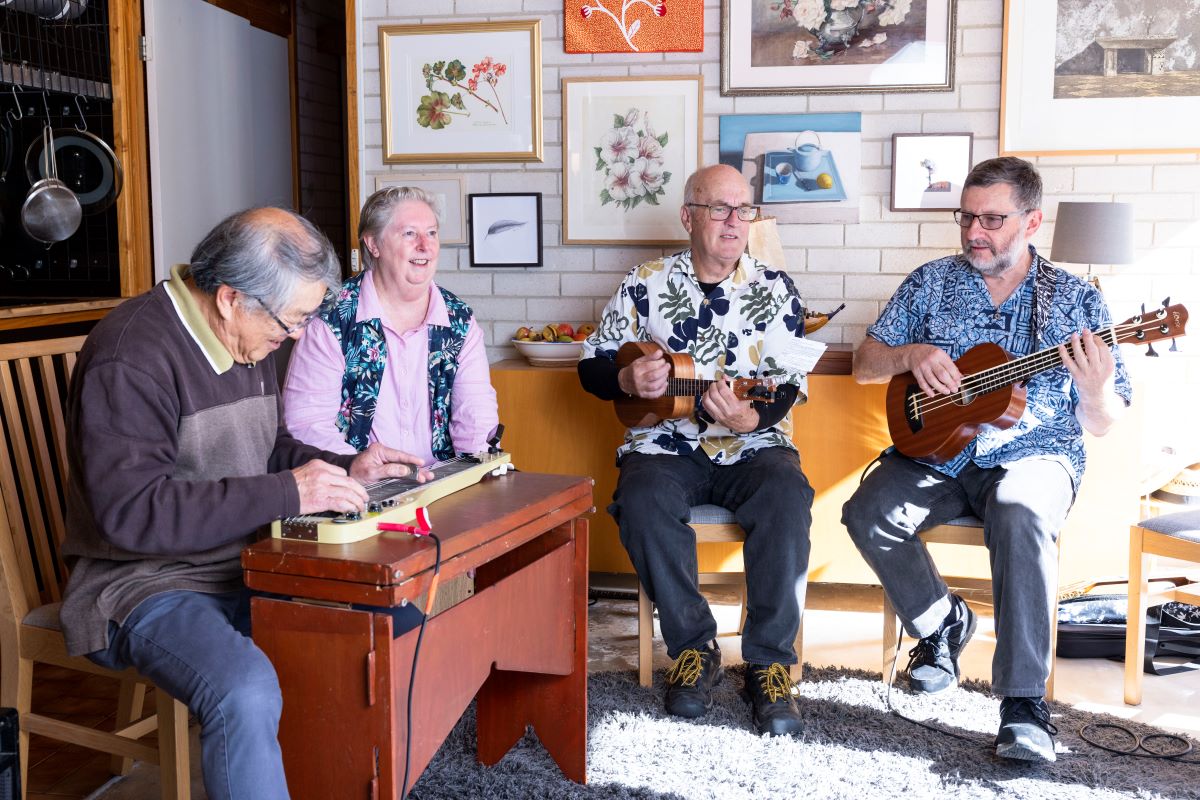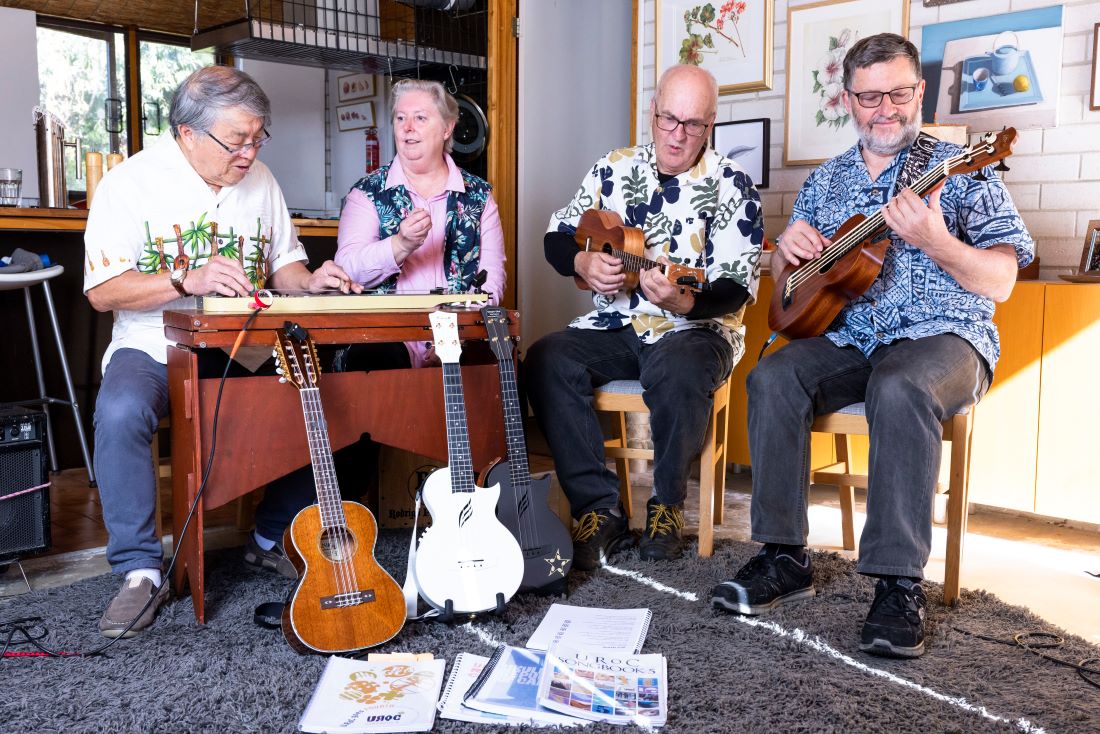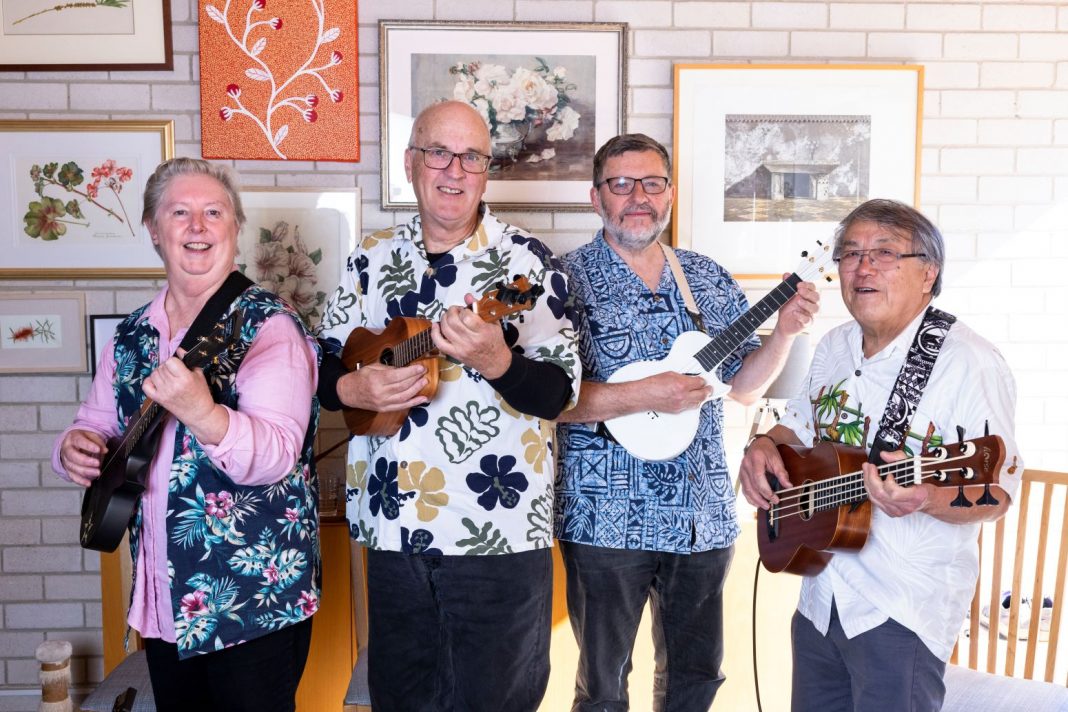From the tropical shores of Hawaii, the ukulele has captured the hearts of many, including Beatles lead guitarist George Harrison who collected the instruments. Strumming soothing sounds and catchy tunes, the Ukulele Republic of Canberra has created their own paradise with the instruments in our fair city.
Meeting up on the first Friday and third Saturday of the month at different locations, members come together for a Kanikapila, a Hawaiian impromptu jam session. Often having 40 attendees, they take turns choosing tunes to play from the republic’s songbook with everyone joining in.
“People do bring in their own music and hand that out and sing that as well,” says UROC member, Sandra Shaw.
“Over the last few years, the group has been bringing along an amplifier and microphone; that encourages the shy among us to come out to the front,” adds Rod Fenwick.
Sandra started playing the instrument while working in a preschool in Singapore where the director required each class to have one ukulele. With three adults in each room, there were tensions about who got the uke, so the adults each bought one of their own.
“I bought this blue thing for about $25 Singaporean; it was really dreadful, that’s how it started, I did learn the basic chords,” she smiles.
Returning to Australia, Sandra enrolled in a beginner’s ukulele class by UROC member, Michael Rosenberg. After learning strums and patterns, she joined the group and is coming up on her 10-year anniversary.
Being the partner of a dedicated guitar player, Rod’s wife enrolled in one of Michel Rosenberg’s ukulele classes, joining UROC. She encouraged Rod to come and give it a try. Buying a cheap uke, he went along with no idea how to play it.
“Someone said it’s a guitar, but you hold it like this, my brain went click and I said ‘oh, this is just a little guitar’ and all of a sudden I was able to play the ukulele,” says Rod.
For someone with no guitar experience, the ukulele is still relatively easy to pick up, the pair say. Rod says that thousands of pop songs use the same four chords, which can be easily transferred.
“The ukulele only has four strings, it’s easier to learn the chords than it is on a guitar or a piano,” he says.
“It’s a happy little instrument that can be picked up quite quickly and, just like any other instrument, the subtleties can take longer to grasp but a lot of people can be playing quickly and that’s a good thing for beginners,” says Andrew Rankine, another UROC member.
Creating a republic
Charlie Chan, one of the founding members, says the inspiration came from the National Folk Festival, where he was strumming a uke and someone asked if he wanted to start a group. Forming in 2006, over 1,000 members have come and gone throughout the years. Today, around 100-plus members are on the books, some of whom belong to more than one ukulele group.
“If they want the anarchy of UROC, they come to UROC; if they want the regimen of having somebody up there singing and playing at you, they go somewhere else,” says Andrew.
UROC has a collection of songbooks, which have been created collaboratively. Members bring in songs they enjoy and were popular in the sessions to be collated, edited, and included. With only one original song in their collection, a community licence means they can choose well-known tunes.
“Sometimes, they are simplified, you can see they are pop songs. People can pick them up, look, find a song they like, they know and play it,” he says.
The Canberra Ukulele Luau is played at the beginning of each jam session and is the only original song written by the committee in the group’s repertoire. Featuring different places and animals of the region, the members say it is a fun nod to Canberra.
Rod’s go-to tune is Friday I’m in Love by the Cure, while Sandra enjoys strumming Down on the Corner by Creedence Clearwater Revival. No matter what song is chosen, they are happy to be involved in the group.
“Otherwise, I could be sitting at home, looking at the wall. It has added people into my life, to me that is one of the best things,” says Rod.
“It’s inclusive of all sorts of people, it doesn’t matter if you play the ukulele, you come along. I keep telling my husband he should come along and use a shaker,” Sandra says.


Out and about
Around 18 of the most confident members take part in the UROC performing group. Rod has been asked to help the group learn tracks to play in the community.
“We’re trying to memorise songs,” Rod says. “I’m over 60, a lot of others are over 60 as well, it is harder. So, just trying to learn to memorise a few songs and then you can engage with the audience.”
UROC was invited to play at the National Folk Festival for many years, and they also travel to ukulele and music festivals from the NSW Central Coast to the Blue Mountains. The local gigs range from community festivals and fun days to aged care visits and more.
“One lady asked me at a recent event do we need to be paid. I said ‘Well, you can pay us – we do play for wine, chocolate, flowers, a cup of tea or just love,” smiles Sandra.
The group host the Gang Gang Tang Festival to connect with other ukulele enthusiasts around Canberra and Australia. Every few months they host an event for members where just easy songs are being played. Previously known as Three Chord Thursday, it has moved to Five Chord Friday.
“I think they’re the most popular nights. There are people who come out because to them, it’s a night out. They can just play a couple of songs, play three chords and it’s not too hard and they can socialise and have a chat,” Sandra says.
Community and connection
Connection is a large part of the group. Members celebrate birthdays and Chinese New Year together, and often head out for a drink after a session. Even during lockdown, they made time to jam remotely.
“The person would lead the song from their computer and everybody else muted and played along. It worked, sort of but it did keep us together,” Sandra says.
Throughout the years, ukulele players from Hawaii, the UK and other places have jammed with UROC, sometimes staying with one of the members while in town. Members tend to be in their mid-thirties and above, however, it is the late working to retirement age that makes up the majority. Charlie says that the age demographic is drawn to the songs they play, such as The Beach Boys and The Beatles.
“For a lot of ukulele groups, music stopped at around 1970 but we like to keep going. We like to think there is music still being written; in the performing group, a lot of our songs are ‘90s and 2000s,” says Andrew.
Ukuleles are often thought to be the tiny percussion instruments of days gone by; however, the instruments are now a whole lot more modern, electric and cheerful, says Rod. They are also a cheap hobby; for $200 you can get a great ukulele.
There are many different options – electric, bass, tenor, soprano, concert, and baritone, which all come in a variety of sizes. Choosing what type you want to play, depends entirely on you.
“I’d like to say it chooses you basically,” says Sandra. “I started out with that little, teeny tiny one but found my fingers were too fat for it, so I quickly moved to a tenor. It depends on the piece of music you’re going to play.”
Sandra owns four of the instruments, admitting it’s common for ukulele players to get what they call the UAS – Ukulele Acquisition Syndrome. Rod has been bitten by the bug, housing at least seven of the instruments, on top of his collection of guitars.
If the uke isn’t your jam, you don’t have to miss out on the fun. The club has seen its fair share of flutes, banjos, harmonicas and violins. Rod says UROC is great for the soul, and anyone is invited to join their sessions.
“The more the merrier really. You get ukuleles all together in a room, it generates a certain vibe,” says Charlie.
“Everyone gets heard, that’s what I really like about UROC. Everyone gets a go which is not always the case. What is always the case is that music wins, it is just music and sharing music,” says Andrew.
Strum a connection with the Ukulele Republic of Canberra on Facebook.
Get all the latest Canberra news, sport, entertainment, lifestyle, competitions and more delivered straight to your inbox with the Canberra Daily Daily Newsletter. Sign up here.



